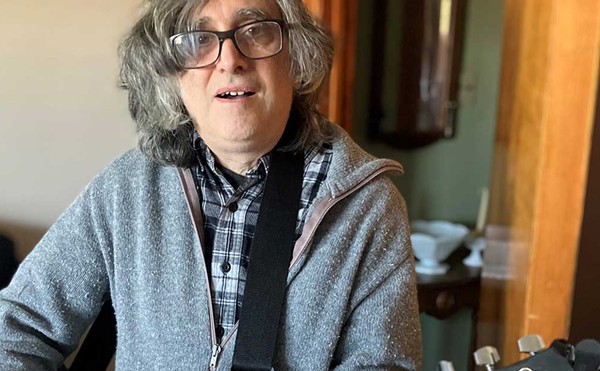Sinatra once sang that if you could make it in New York, he could make it anywhere. The old crooner thug probably never felt the bitter slap of freezing Detroit River winds, or personally hustled the pavement that connects myriad blocks of ominous abandonment, or suffered the hard knocks of a Detroit winter with empty pockets, much less a late-night at the Coney Island at Holbrook and I-75.
In fact, the real proving ground isn’t in the city that never sleeps, but in the city that hasn’t woken up in more than 30 years. Here, rejection isn’t just scant possibility; it’s most often the broad reality. If you can make it out of the Motor City, you might not become some ill-starred local footnote like so many who populate Detroit’s musical scrap heap.
The Platinum Pied Pipers, which is, essentially, in-demand underground producers Waajeed (Robert O’Bryant IV) and Saadiq (Darnell Bolden) — plus a revolving cast of semi-all-star local and global emcees, musicians and singers — won’t be littering local scrap heaps anytime soon. For one thing the duo relocated to Brooklyn a couple of years ago.
Waajeed, you’ll recall, had a hand in Slum Village. He contributed to their Dirty District comp, and co-produced songs on 2002’s Trinity (Past, Present, and Future). He’s worked with pal producer Jay Dee on Welcome 2 Detroit and co-produced songs with Dwelle.
PPP’s long-awaited debut, Triple P, which is out this week on California indie Ubiquity, might just set a new benchmark in urban music. And that’s not the group’s sudden international critic-darling hyperbole talking, either. PPP’s Euro shows are already selling out medium-size venues, and the UK press has glommed onto them, calling their sound “next level” stuff, but all that’s for good reason.
The PPP sound defies pop industry compartmentalizing. Music stores will have a hard time filing Triple P; it’s hip hop, yeah, but it’s harder; it’s R&B too, but rougher, and sometimes more romantic. Lazy critics and record shop clerks might hastily label it “nu-soul.”
You want a category for PPP’s sound? Then ask Waajeed; he calls it simply, “MPC-driven world-music.” (As in multimedia personal computer.)
“I didn’t want to make a hip-hop or even a boom-bap album,” Waajeed says. “That’s brainless. It wasn’t a challenge for me. The point of the record was to sell the music, not the hype.”
The genesis of Triple P, he says, was simple: Give the people what they want, but something different and, more importantly, “unexpected.”
So Waajeed and Saadiq now call New York home, but they say their hearts and minds are in Detroit. Each song on Triple P references in some way the dirty, if not warm, sound that thrives here. Nearly half the album was conceived, recorded and mastered in Detroit, the remainder divided between New York, Los Angeles and London.
But why Brooklyn? They had to, they say, in an effort to meet music career demands.
“We just felt there was going to be more opportunity outside of here,” Waajeed says.
“Brooklyn is Detroit, but with more people. The thing that stands out most is the community pride. Brooklyn is the same, just like Detroit thinks of itself as Detroit, U.S.A.”
Since Waajeed inherited his first drum machine, he’s been in constant Prince-like pursuit of perfection. But he’s the first to say he’s nowhere near perfection. He’s never satisfied; he will find something wrong in his recordings. Even his most celebrated work (such as Slum Village’s “Star”) unsettles him; he inevitably senses missed opportunities to go back and change something.
For the recording of Triple P — Waajeed slept an average of two hours a night for the duration of the album — songs came in various forms, and were finally narrowed down from dozens to 16.
“Every song on the album has at least two versions,” Waajeed says. “Some even had five. I’d say there were 40 finished tracks, minimum.”
Since their 2000 inception, PPP has been a two-man operation. And together, the pair has produced Japan’s DJ Mitsu and Germany’s ASD among others. Saadiq might be seen as the duo’s silent partner, but he’s completely different on both the album and onstage, hence his unofficial handle “Saadiq the Freak.” A multi-instrumentalist trained in guitar, drums, keyboard and bass, Saadiq was even tutored by Motown singer-composer Barrett Strong.
But the Motown parallels don’t end there. Like his Detroit-launched Bling47 label (which released The Official Jay Dee Instrumental Series, and is still very active), Waajeed will use PPP as an umbrella for like-minded artists, where he’ll hone their skills, get them into proper venues, and in the tradition of auto factories, operate like an assembly line, introducing certain models to audiences when they’re ready.
Waajeed and Saadiq hooked up through mutual friend and ex-Slum Villager Baatin, who grew up with Waajeed in Conant Gardens on the East Side. Originally intended as a tongue-in-cheek reference to R. Kelly and the “jiggy” MTV hip-hop and BET Uncut milieu, the mockingly monikered Platinum Pied Pipers began as a reaction against the idea that hip hop had grown old, stale and boring. In short, these two cats from the dirty district set out to wake up the world.
And it took British DJ Benji B to kick-start international PPP buzz. The DJ took an immediate liking to the beautiful-ugly sound coming from Motown, and made Waajeed and PPP a fixture on his weekly BBC 1 Internet radio program, Deviation with Benji B.
The bond between Benji and PPP became such that Waajeed used B’s program to test his newest tracks. Hence, DJs all over Europe, and those in New York and California, snatched up anything Waajeed- or PPP-related.
Ubiquity picked up on the noise and in 2002 signed PPP. And now, as it often is with many Detroit artists, Platinum Pied Pipers are, without warning, up-to-the-minute stars in major cities here and abroad, but not in Detroit.
Triple P’s Detroit roster includes stalwart emcees Lacks and Invincible, plus vocalist Zeno, a backup singer for crooner Dwele. But it was the contribution from Detroit hip-hop star Jay “Dilla” Dee (on two of the album’s tracks) that brought out the best of the production team.
“What better than to have Dilla rhymin’ over a sloppy beat and nasty cuts,” Waajeed says. Waajeed is equally satisfied with Lacks. “I love that guy,” he says. “We never end on a bad note.”
PPP also enlisted the vocals of two divergent, New York-based singers, Tiombe Lockhart and Georgia Muldrow. The former brings melodic, almost sensual warmth; the latter offers attitude, a rough and rugged face-slap, if you will. Yet the focus is still on the producer as leader.
Waajeed says he refuses to be boxed in musically. “I am definitely the control-freak of the group,” he says, half-jokingly. “I don’t want to be compared or classified to any one thing.”
The group spent the last few weeks on a tour through England and Germany, offering a set to match the buzz as a live show to be reckoned with.
With so much glad-handing and arse-kissing, what could be going on in Waajeed’s head? Well, his gut, for one thing.
“We appreciate all the love and support, but what matters most is my diet,” Waajeed says, with no hint of irony. “My diet is everything I take in whether it’s food, who I keep close to me, what I see or hear; all the things in my circle. I need the purest things around me.”
On tap for PPP is more touring. For Waajeed there’s production work to be done on Invincible and Lockhart’s forthcoming solo albums, and a marriage to Jackie, the woman who’s long been by his side.
Whatever the future holds, Waajeed is prepared to avoid the scrap heap. All he asks is that you keep your head up and yours ears open.
Why?
“Because it’s damn good music.”
Record release show Thursday, May 12, at Fifth Avenue Downtown (2100 Woodward Ave., Detroit; 313-471-2555) with surprise guests and DJ HFUSION. David Valk is a freelance writer. Send comments to [email protected]





